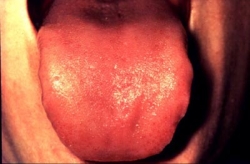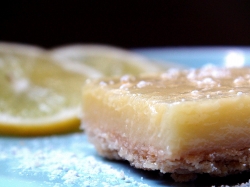Have you ever spit something out because you thought it was gross? Have you ever watched someone else eat that same food and love it? Have you ever wondered why they can stand to eat that food while you cannot? Your mouth is an amazing machine. It may seem like you know everything that is going on in there, but besides your teeth and your tongue working, there are many other things happening when you chew. They are so small you cannot see them. Let's "look" at these parts of your mouth and see why you can't stand to eat what someone else loves.
Your body has put guards inside your mouth. It's their job to say "Stop!" and then check out the foods, letting some through and sending others out. These guards are called
taste buds, the organs on your tongue that tell you what you are eating. They let you taste the sweet of fruits, the salty of nuts, the bitter of spinach, and the sour of lemons. If it has stuff that could be good for you, they tell your brain "Yum! Swallow this!" If it's rotten or poisoned or if someone put mud in your ice cream they might say "Yuck! Spit it out!"
Taste buds are also in your throat
and stomach. Only your tongue's taste buds report to your
brain, though. This is a good thing, since the stuff is your
stomach is what you would throw up. That means that if you could
taste what's in your stomach in the same way as you can taste from
your tongue, you would always taste throw up

Now that's a lot of taste buds.
BodyParts3D/Anatomography, Public domain, via Wikimedia Commons
Stick out your tongue and look in the mirror. Do you see all those pink bumps? Those are
papillae, which hold your taste buds. Your saliva breaks up the food and then runs it through these bumps. Think of water running over rocks in a river in a canyon. The bumps then tell your brain to swallow or spit the food out. Some people might tell you that you taste certain things on only parts of your tongue: bitter in the back, sweet in the front. It's not true! Your whole tongue can taste all tastes.
Feel the breeze through your hair. Feel a fly buzz by your arm. Your hairs help you feel more than your skin does by itself. Your taste buds need to be great at their job, so they can tell you what's good to eat and what isn't. That's why your papillae are covered with tiny hairs called
microvilli. They make it so sugar tastes sweeter and lemons more sour. So, your taste "buds" are not buds at all. If "buds" make you think of a rose that has not yet bloomed, think again. They are more like hairy bumps. But we call them buds because "bumps" just doesn't sound as catchy.

Lemon bars; lemons with just the right amount of sugar.
Fun fact! You also have microvilli in your ear! They buzz whenever sound comes in, like grass swaying in the breeze.
Most people have 10,000 taste buds on their tongues. As you get older and eat more and more things, you wear them down. Some of them do not come back. Older people might only have 5,000 taste buds. No wonder they can eat lima beans so easily while a four year old wants to spit them out! If you really want to keep as many taste buds as you can, you only have to follow one very easy rule: don't smoke.
Your taste buds are great guards that keep bad things out of your body. Still, there are smarter ways to tell if something is good for you to eat or not. Smell it! Most of your taste comes from what you smell anyway. Your tongue will only tell you about the taste of something: sweet, salty, bitter, and sour. They can't tell your brain the flavor of something: the smell of pumpkin pie or pine trees or the smell of a zoo. Your
olfactory sense is your sense of smell. So, the next time you are going to eat something, stick your nose right in and take a deep sniff!

And now, for a closer sniff.
Universalashic, CC BY-SA 3.0 , via Wikimedia Commons
Fun Fact! Have you ever smelled something that made an old thought come rushing back? Smell is more connected to your memory than any of your other senses. That's because what you sniff has the shortest journey to your brain!
Taste buds have changed over the last tens of thousands of years. We used to need them to be able to live in the forest. They told us that these bitter mushrooms were poisonous while those sweet berries would give us energy. Do not try this in a forest today: your taste buds can be tricked sometimes. These days we use our tongues to find things that we think taste good. Just remember, your taste buds may get rid of the yucky stuff and bring in the yummy stuff, but they will not always lead you to the healthy stuff.
References:Kids' Health. "What Are Taste Buds?" Kids' Health, 2011. <
http://kidshealth.org/kid/talk/qa/taste_buds.html>
Neuroscience for Kids. "Smell -- the nose knows." Neuroscience for Kids, 2011. <http://faculty.washington.edu/chudler/nosek.html>
ABC Science. "Do animals taste the same things as humans?" ABC Science, 2010. <http://www.abc.net.au/science/articles/2010/08/12/2980854.htm>